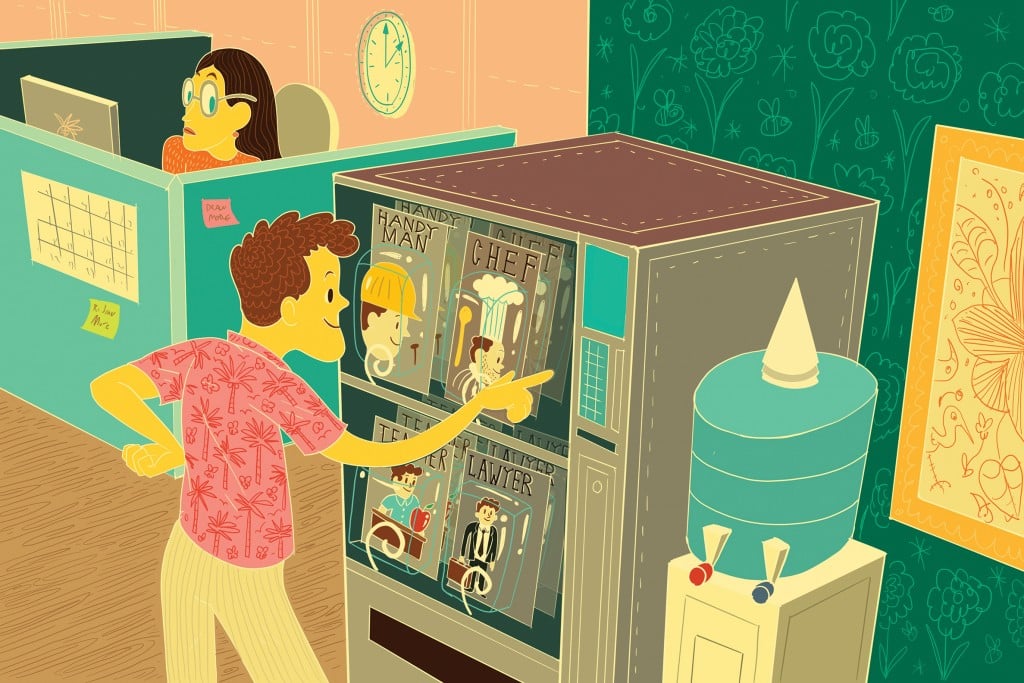What’s the Right Move?

Reader wonders whether to quit a hideous job to focus on finding a better one, or to stay put and hunt for something better on the side
Q: Is it really easier to get a job offer when you already have a job? That’s what I hear, but I’m dying to leave the company where I currently work. My wife makes enough that we could get by for a bit. I’m also struggling to find the proper time to devote to a search because I have so much going on with my current job. I’m wondering if I should resign; then I’ll have time to look for my next position.
A: Cue up The Clash: “Should I stay or should I go now/ If I go, there will be trouble/ And if I stay it will be double.” Great band, but bad advice, because you should stay. “Short of it being a hostile work environment, I would recommend staying until you find a position that better fits your passion,” says Melody Fukushima. Fukushima is an executive search consultant at Inkinen Associates, a Honolulu-based company that handles corporate recruiting for businesses in Hawaii, Asia and the U.S. Mainland.
“You have a higher negotiating power when you have a job already, whereas when you are not employed, you tend to make sacrifices, whether it’s taking a lower salary or less benefits. We like to think an employer would make a fair offer based on the job itself, but they may make that offer on the lower end of the salary if they know you aren’t working.”
Your employment search may also take longer than you think; what if it stretches to six months or more? Being employed gives you the luxury of being pickier if things drag on. Plus, someone who is working tends to be seen as “shinier” in the eyes of potential employers, says Fukushima.
At Inkinen Associates, she says: “Our niche is more the passive market, rather than the unemployed market. That is, we present opportunities to people who are already working, who might not even be looking for another job, with a role that has more salary, opportunities for leadership and advancement. The unemployment rate in the Islands is so low; it’s basically zero.” Being unemployed in such a tight market is likely to raise red flags and lower your overall appeal as a candidate.
If your current job is so odious you simply must resign, do so respectfully and with plenty of notice. “Hawaii is small. It’s worth the additional two weeks to leave on a good note. Everyone knows someone.”
Q: As a freelancer, I work with a lot of clients. Every project typically starts off great, then becomes so different than what was originally presented to me. How can I stop feeling chronically taken advantage of?
A: It sounds like you are at the point in your career where you need to start drafting up formal scope of work documents. The good news is there are plenty of templates online. The bad news is everyone calls them SOWs, which brings to mind lolling livestock. To get a common-sense, no pork approach for this task, I spoke with Minda Miloff, a life-work coach in Montreal (coachminda.com). Miloff worked as a freelance training consultant for 20 years before becoming a coach, so she had a lot of experience with scope of work proposals, and now, with coaxing people to actually try them. Here are her suggestions.
- Try to connect with a client in person, rather than via text or email, for a preliminary meeting.
- Before preparing an initial proposal, “Have them give you a range on the budget, so at least you know what you are dealing with,” Miloff says. “You don’t want to prepare based on a $50,000 budget if they only want to spend $3,000.”
- “Define what the client thinks is the problem, a summary of what you think the need is,” says Miloff. “Look at the different variables and include those.” Think about time frame, deliverables, tasks. What are you going to produce and do? What kind of feedback are you going to need as you go, and how much time should be built in for that? “Then you can say, ‘Based on our conversation, this is what I understood, here’s how long I estimate it will take, and here’s a breakdown of my fees.’ Mention the daily rate or hourly rate if it exceeds the scope of work.”
- At that stage, you are “getting agreement, you are ensuring you are on the right path,” Miloff says. “And then you might need a much more detailed proposal, and if so, you would charge for that service.” A proper scope of work could take a whole day to prepare, though, she notes, every field has a slightly different standard for what is acceptable as a proposal.
- Often, clients will say, “But this is more expensive than I thought it would be!” A way around that, she suggests: “Give them a menu. Build a proposal with various levels of cost. You can do A and B, but not C and D.” Sometimes it highlights things they didn’t even take into account. And as you get better at freelancing, you can highlight other areas where a decision may impact their business, how it will relate to their bottom line.” If they simply can’t afford you, well, “You have to be willing to lose some business in order to be credentialed.”
The biggest mistake freelancers make, Miloff says, is that in the effort to get work, “people just say ‘yes, yes, yes.’ Instead, say, ‘Let me get back to you.’ Come up with good questions. Are there subject matter experts available to work with? What is the time frame? A better answer than yes is, ‘I really appreciate your interest; I’d like to know more.’ ”






